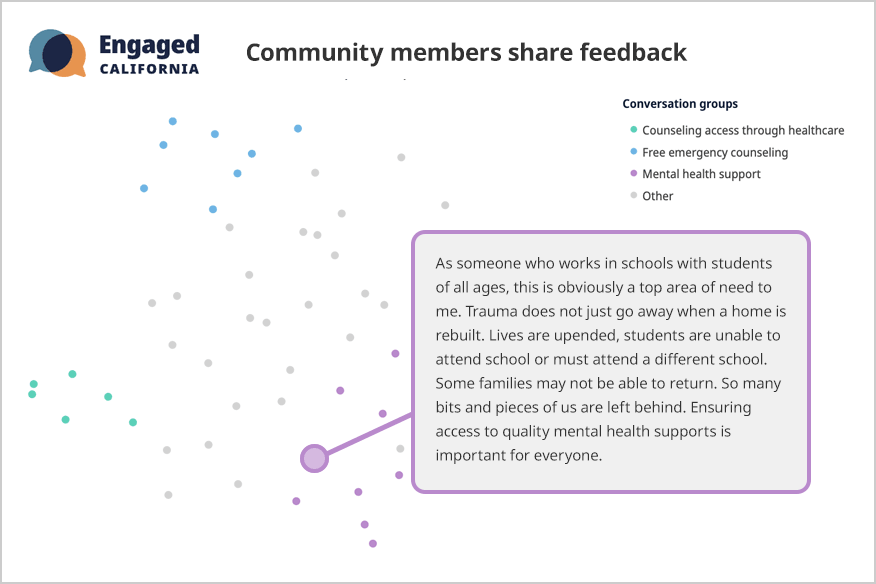
Starting in March, we began a first-in-the-nation pilot in response to a natural disaster. We launched Engaged California to create a two-way conversation with those impacted by the LA fires. While the program exists independently of the response, the Office of Data and Innovation (ODI) and the Carnegie Endowment for International Peace were honored to apply the program toward helping with the recovery.
As a result, we’ve heard their stories, insights, and heartbreak. More than 1,300 comments were shared, detailing what mattered most to them through the online tool—not just about what was lost, but about what they hope comes next.
This effort wasn’t a survey. It was a space to speak freely. To name the gaps in recovery. To highlight what’s working. And to shape what’s possible.
We asked residents to weigh in on 10 recovery topics—from housing and infrastructure to emotional wellbeing and wildfire prevention. However, the most powerful insights came not from the categories themselves but from the words people wrote: layered, honest, sometimes urgent, sometimes hopeful.
And we listened.
Our team at ODI analyzed those stories, drawing out commonalities and differences in what people said and how they said it. From those patterns, we began identifying where state and local governments might take immediate action, where we need to amplify what already exists, and where we need to pause and create space for deeper community dialogue before moving forward.
What we heard
Some needs stood out clearly. Residents spoke about the importance of trusted mental health spaces and better emergency alerts that reach everyone, not just those with smartphones. They voiced a deep desire for thorough environmental testing of soil and air. And they expressed a yearning to feel seen and supported, especially those who rent, who’ve lost homes, or who are undocumented.
Other areas revealed tensions. How do we rebuild quickly and also rebuild better? Should utilities be publicly owned? Should recovery funds go directly to individuals or through local nonprofits and small businesses? These aren’t questions with easy answers. But they’re the right questions to ask, together.
What comes next
The findings from this first phase are now available. They are not the final word—they are an invitation. An invitation to agencies, local leaders, and community members to come together and co-create what recovery looks like.
In Altadena and Palisades, where the fires hit hardest, we’ll be working with partners to design a deeper process for dialogue. Not just another meeting, but a real space to weigh trade-offs, surface shared values, and shape collective action. The goal isn’t consensus for the sake of consensus. It’s to make the best decisions, informed by those who live with the consequences.
We know that rebuilding lives and communities takes more than a plan. It takes trust. And trust starts with listening.
Thank you to every resident who spoke up. Your voices are helping shape what comes next.
You can read more about the findings from the resident voices on the Engaged California website.